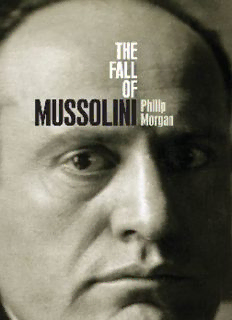
The Fall of Mussolini: Italy, the Italians, and the Second World War PDF
Preview The Fall of Mussolini: Italy, the Italians, and the Second World War
THE FALL OF MUSSOLINI This page intentionally left blank THE FALL OF MUSSOLINI ITALY, THE ITALIANS, AND THE SECOND WORLD WAR PHILIP MORGAN 1 3 GreatClarendonStreet,Oxfordox26dp OxfordUniversityPressisadepartmentoftheUniversityofOxford. ItfurtherstheUniversity’sobjectiveofexcellenceinresearch,scholarship, andeducationbypublishingworldwidein Oxford NewYork Auckland CapeTown DaresSalaam HongKong Karachi KualaLumpur Madrid Melbourne MexicoCity Nairobi NewDelhi Shanghai Taipei Toronto WithoYcesin Argentina Austria Brazil Chile CzechRepublic France Greece Guatemala Hungary Italy Japan Poland Portugal Singapore SouthKorea Switzerland Thailand Turkey Ukraine Vietnam OxfordisaregisteredtrademarkofOxfordUniversityPress intheUKandincertainothercountries PublishedintheUnitedStates byOxfordUniversityPressInc.,NewYork (cid:1)PhilipMorgan2007 Themoralrightsoftheauthorhavebeenasserted DatabaserightOxfordUniversityPress(maker) Firstpublished2007 Allrightsreserved.Nopartofthispublicationmaybereproduced, storedinaretrievalsystem,ortransmitted,inanyformorbyanymeans, withoutthepriorpermissioninwritingofOxfordUniversityPress, orasexpresslypermittedbylaw,orundertermsagreedwiththeappropriate reprographicsrightsorganization.Enquiriesconcerningreproduction outsidethescopeoftheaboveshouldbesenttotheRightsDepartment, OxfordUniversityPress,attheaddressabove Youmustnotcirculatethisbookinanyotherbindingorcover andyoumustimposethesameconditiononanyacquirer BritishLibraryCataloguinginPublicationData Dataavailable LibraryofCongressCataloginginPublicationData Dataavailable TypesetbySPIPublisherServices,Pondicherry,India PrintedinGreatBritain onacid-freepaperby BiddlesLtd,King’sLynn,Norfolk ISBN 978–0–19–280247–7 1 3 5 7 9 10 8 6 4 2 The book is dedicated with love to my wife, Glen, and to my daughter, Ellen, who both think that I am becoming like my father, the silent witness of this book. This page intentionally left blank Preface MyfatherfoughtintheBritisharmyagainsttheItaliansandGermansinNorth Africa,andagaininthelongItaliancampaignof1943to1945.Mymotherand Icouldneverunderstandhowamanwith suchbigandclumsyhandscould havemadehiswaythroughthelowerrankstobeasergeantinabombdisposal unit. He was always reticent about his war experiences in North Africa and Italy,evenwhenheknewthatIwaswritingthisbookandwasbeginningto crowdhimaboutit.Heremembered,orallowedhimselftoremember,sifting withothersoldiersthroughthesilkshirtsleftinthewardrobeoftheabandoned villa of a Fascist leader on the Adriatic coast, and how some of his fellow soldiers speculated and bartered their way to useless occupation currency fortunes before demobilization. In strictly rationed disclosures, he gave me some sense of a war fought against boredom and inertia, interspersed with periods of intense danger and activity, and of things going wrong, militarily and logistically. He apparently ended up Wghting with the American forces duringtheItaliancampaign.Wasthisdeliberate,orwashesimplyputonthe wrongship,orlandedinthewrongplace? HecertainlysaidverylittleaboutItalyandtheItalians,andthisissurprisingin view of what the war did to my father. Coming from a large working-class mining family in South Wales,for whom England was aforeign country,he demobilizedtoamarriagewithmymother,aLondon-bornLandArmy‘girl’,a short stint with a radio components factory (those hands again), and then emergency training to become a school teacher in the new towns just north of London. The whole itinerary was an individual case of the war’s unintendedenablingandtransformingimpactonpeople’slives.Thewarmade peoplemobile,largelyagainsttheirwillanddesires,inbothaspatialandmind- openingsense.Forconscriptslikemyfather,itunearthedandtestedpeople’s capacities,andopenedupnewopportunities. My father’s reticence about his role in wartime Italy as foreign invader- occupier-liberator,beliestherhetoricalquestionaskedabouttheEastGerman politicalpoliceinanothercontext,‘Whyaresomethingseasiertoremember themoretimehaspassedsincetheyoccurred?’1Thelongertimewenton,the more silent my father became, as he decided not to reveal his Italian war. I wonderedwhetherthepersonaltestimonieswhichdoexisthavecoveredup some experiences, while uncoveringothers, making thesewitnesses as silent viii Preface as my father. Although he did not want to talk about it, I at least came to realizethatpartofmanyItalians’experienceofthewarwouldhavebeenhow theyreactedtoinvadingandoccupyingforceswhichincludedmyfather. Twosummersago,mywifeandIwereonholidaywalkinginthewoodedhills oftheLanghe,southofTurininnorth-westernItaly.Iwascertainlynotona Weldtripresearchingforthisbook,thoughIprobablyshouldhavebeen.But wecouldnothelpnoticingthatthewarmemorialsinthevillageswepassed through commemorated those who died in the ‘war of liberation’ between 1943and1945,butmadenomentionofthecasualtiesofthe‘Fascist’warof 1940to1943.Inasmallisolatedchapel,wedidcomeacrossamodestsignand photographonthewall,recordingthedeathofayoungpriestatthehandsof the ‘Nazi-Fascists’ in 1944. It had no more than a generic indication of the circumstancesinwhichhewaskilled,andthereasonsforwhichhedied. We had hardly discovered anything new. But it is clearly important how peoplerememberwars,becauseofwhatitrevealsordisguisesaboutthevalues andcultureofpost-warsocietyandthosewhosurvived.‘Lifeisnotwhatone lived,butwhatoneremembersandhowoneremembersitinordertorecount it,’ says Gabriel Garcia Ma´rquez,2 whose novels are all about the making of historicalandculturalmyths.TheLanghevillagemonumentstothewarneed decipheringandcontextualizing.Whoputupthemonuments,ordecidedon theinscriptions,thelocaltowncouncil,thelocalpartisansassociation?Whose selective commemoration were they? If it was the ex-partisans, then they belonged to an organization committed to protecting a certain collective memory of a certain war. I wondered how those locals felt whose sons had diedWghtingtheFascistwarsof1940to1943.Apubliccommemorationmight well be imposing one kind of memory on another. And when were they erectedorinscribed?Howsoonafterthewar?Iwonderedhowgeographically speciWc this sort of remembrance was. If I went on a walking holiday in Tuscany,wouldIWndthesamemonuments,thesameinscriptions? This chance holiday encounter with commemorations of the country’s recent past, opened up wider questions. Did Italians deliberately choose to forgetthat Fascistwar,to becomeobliviousto it?Orarewedealing rather with contested memories and commemoration? There will be much more onhistoricalmemoryandreminiscenceinthebook,anditwill,Ihope,be interesting to follow how a historian of archive documents such as myself deals with a diVerent order of documentation in popular history, the oral Preface ix andwrittentestimoniesofordinaryItalians.Itisworthadding,atthispoint, that all the translations from Italian language sources are my own. P.J.M. Acknowledgements I would like to thank all my editors at Oxford University Press, especially theoneatthebeginning,CatherineClarke,andtheoneattheend,Luciana O’Flaherty,fortheinterestandattentiontheyhavegiventothebookandits author.
Description: